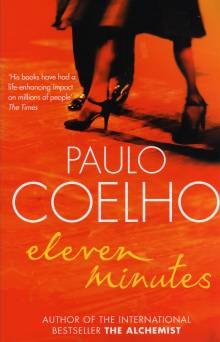The History of Love by Nicole Krauss

Nicole Krauss's The History of Love is a hauntingly beautiful novel about two characters whose lives are woven together in such complex ways that even after the last page is turned, the reader is left to wonder what really happened. In the hands of a less gifted writer, unraveling this tangled web could easily give way to complete chaos. However, under Krauss's watchful eye, these twists and turns only strengthen the impact of this enchanting book.
The History of Love spans of period of over 60 years and takes readers from Nazi-occupied Eastern Europe to present day Brighton Beach. At the center of each main character's psyche is the issue of loneliness, and the need to fill a void left empty by lost love. Leo Gursky is a retired locksmith who immigrates to New York after escaping SS officers in his native Poland, only to spend the last stage of his life terrified that no one will notice when he dies. ("I try to make a point of being seen. Sometimes when I'm out, I'll buy a juice even though I'm not thirsty.") Fourteen-year-old Alma Singer vacillates between wanting to memorialize her dead father and finding a way to lift her mother's veil of depression. At the same time, she's trying to save her brother Bird, who is convinced he may be the Messiah, from becoming a 10-year-old social pariah. As the connection between Leo and Alma is slowly unmasked, the desperation, along with the potential for salvation, of this unique pair is also revealed.
"The poetry of her prose, along with an uncanny ability to embody two completely original characters, is what makes Krauss an expert at her craft. But in the end, it's the absolute belief in the uninteruption of love that makes this novel a pleasure, and a wonder to behold." --Gisele Toueg
Memoirs of a Geisha by Arthur Golden

According to Arthur Golden's absorbing first novel, the word "geisha" does not mean "prostitute," as Westerners ignorantly assume--it means "artisan" or "artist." To capture the geisha experience in the art of fiction, Golden trained as long and hard as any geisha who must master the arts of music, dance, clever conversation, crafty battle with rival beauties, and cunning seduction of wealthy patrons. After earning degrees in Japanese art and history from Harvard and Columbia--and an M.A. in English--he met a man in Tokyo who was the illegitimate offspring of a renowned businessman and a geisha. This meeting inspired Golden to spend 10 years researching every detail of geisha culture, chiefly relying on the geisha Mineko Iwasaki, who spent years charming the very rich and famous.
The result is a novel with the broad social canvas (and love of coincidence) of Charles Dickens and Jane Austen's intense attention to the nuances of erotic maneuvering. Readers experience the entire life of a geisha, from her origins as an orphaned fishing-village girl in 1929 to her triumphant auction of her mizuage (virginity) for a record price as a teenager to her reminiscent old age as the distinguished mistress of the powerful patron of her dreams. We discover that a geisha is more analogous to a Western "trophy wife" than to a prostitute--and, as in Austen, flat-out prostitution and early death is a woman's alternative to the repressive, arcane system of courtship. In simple, elegant prose, Golden puts us right in the tearoom with the geisha; we are there as she gracefully fights for her life in a social situation where careers are made or destroyed by a witticism, a too-revealing (or not revealing enough) glimpse of flesh under the kimono, or a vicious rumor spread by a rival "as cruel as a spider."
Golden's web is finely woven, but his book has a serious flaw: the geisha's true romance rings hollow--the love of her life is a symbol, not a character. Her villainous geisha nemesis is sharply drawn, but she would be more so if we got a deeper peek into the cause of her motiveless malignity--the plight all geisha share. Still, Golden has won the triple crown of fiction: he has created a plausible female protagonist in a vivid, now-vanished world, and he gloriously captures Japanese culture by expressing his thoughts in authentic Eastern metaphors.
The Zahir by Paolo Coehlo

The press chat cites 65 million copies of Coelho's eight previous novels in print, making the Brazilian author one of the world's bestselling novelists (150 countries and 56 languages). This book, whose title means "the present" or "unable to go unnoticed" in Arabic, has an initial staggered laydown of eight million copies in 83 countries and 42 languages. It centers on the narrator's search for his missing wife, Esther, a journalist who fled Iraq in the runup to the present war, only to disappear from Paris; the narrator, a writer, is freed from suspicion when his lover, Marie, comes forward with a (true) alibi. He seeks out Mikhail, the man who may be Esther's most recent lover and with whom she was last seen, who has abandoned his native Kazakhstan for a kind of speaking tour on love. Mikhail introduces the narrator to a global underground "tribe" of spiritual seekers who resist, somewhat vaguely, conventional ways of living. Through the narrator's journey from Paris to Kazakhstan, Coelho explores various meanings of love and life, but the impact of these lessons is diminished significantly as they are repeated in various forms by various characters. Then again, 65 million readers can't be wrong; the spare, propulsive style that drove The Alchemist, Eleven Minutes and Coelho's other books will easily carry fans through myriad iterations of the ways and means of amor.
Eleven Minutes by Paolo Coehlo

From SPi Writers Guild
Eleven Minutes tells the story of Maria, a young girl from a Brazilian village, whose first innocent brushes with love leave her heart-broken. At a tender age, she becomes convinced that she will never find true love, instead believing that 'Love is a terrible thing that will make you suffer...' A chance meeting in Rio takes her to Geneva, where she dreams of finding fame and fortune yet ends up working the streets as a prostitute. In Geneva, Maria drifts further and further away from love while at the same time developing a fascination with sex. Eventually, Maria's despairing view of love is put to the test when she meets a handsome young painter. In this odyssey of self-discovery, Maria has to choose between pursuing a path of darkness, sexual pleasure for its own sake or risking everything to find her own 'inner light' and the possibility of sacred sex, sex in the context of love.
In this gripping and daring new novel, Paulo Coelho sensitively explores the spiritual nature of sex and love and invites us to confront our own prejudices, demons and embrace our own 'inner light'.
Love You Forever by Robert N. Munsch

The mother sings to her sleeping baby: "I'll love you forever / I'll love you for always / As long as I'm living / My baby you'll be." She still sings the same song when her baby has turned into a fractious 2-year-old, a slovenly 9-year-old, and then a raucous teen. So far so ordinary--but this is one persistent lady. When her son grows up and leaves home, she takes to driving across town with a ladder on the car roof, climbing through her grown son's window, and rocking the sleeping man in the same way. Then, inevitably, the day comes when she's too old and sick to hold him, and the roles are at last reversed. Each stage is illustrated by one of Sheila McGraw's comic and yet poignant pastels. (Ages 4 to 8) --Richard Farr
Love in the Time of Cholera by Gabriel Garcia Marquez

From Library Journal
While delivering a message to her father, Florentino Ariza spots the barely pubescent Fermina Daza and immediately falls in love. What follows is the story of a passion that extends over 50 years, as Fermina is courted solely by letter, decisively rejects her suitor when he first speaks, and then joins the urbane Dr. Juvenal Urbino, much above her station, in a marriage initially loveless but ultimately remarkable in its strength. Florentino remains faithful in his fashion; paralleling the tale of the marriage is that of his numerous liaisons, all ultimately without the depth of love he again declares at Urbino's death. In substance and style not as fantastical, as mythologizing, as the previous works, this is a compelling exploration of the myths we make of love. Highly recommended. Barbara Hoffert, "Library Journal"Copyright 1988 Reed Business Information, Inc.
Kabbalah: A Love Story by Lawrence Kushner
 Sometime, somewhere, someone is searching for answers……
Sometime, somewhere, someone is searching for answers……in a thirteenth-century castle
…on a train to a concentration camp
…in a New York city apartment
Hidden within the binding of an ancient text that has been passed down through the ages lies the answer to one of the heart’s eternal questions. When the text falls into the hands of Rabbi Kalman Stern, he has no idea that his lonely life of intellectual pursuits is about to change once he opens the book. Soon afterward, he meets astronomer Isabel Benveniste, a woman of science who stirs his soul as no woman has for many years. But Kalman has much to learn before he can unlock his heart and let true love into his life. The key lies in the mysterious document he finds inside the Zohar, the master text of the Kabbalah.
Share your books in BOOK TALKS this February 23rd at SPi Night Cafe. HAPPY READING!
Reviews from Amazon.com, Publishers Weekly, Library Journal, and SPi Writers Guild .
 by Mahros Abaño
by Mahros Abaño 






























